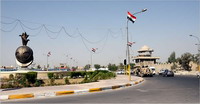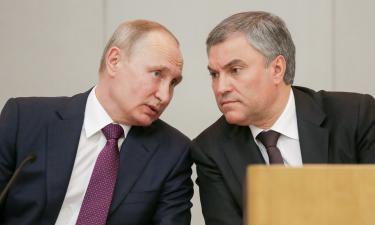17 Iraqis killed in Blackwater shooting
The deadly shooting involving Blackwater USA guards took 17 Iraqi lives but the gunfire was not warranted and those involved should face trial.

The final results of the investigation showed that convoys from the North Carolina-based security company did not come under direct or indirect fire, before the men shot up a key intersection.
"It was not hit even by a stone," government spokesman Ali al-Dabbagh said in a statement.
A U.S.-Iraqi commission also met for the first time on Sunday to review American security operations after the Sept. 16 shootings in which Blackwater guards are accused of opening fire on Iraqi civilians in a main square in Baghdad.
The panel is one of at least three investigations involving Americans. The Moyock, North Carolina-based security company contends its employees came under fire first. The incident has caused outrage among Iraqis and calls for the rules governing those protecting American diplomats to be overhauled.
The Iraqi investigative committee, which was ordered by Prime Minister Nouri al-Maliki, put the casualty toll at 17 killed and 23 wounded, giving a higher number than other estimates, and it found that seven cars were burned or damaged. It said the shootings amounted to a deliberate crime and recommended those involved be held legally accountable.
Al-Dabbagh said the Iraqi Cabinet would weigh the Iraqi findings with those of the joint commission "and subsequently adopt the legal procedures to hold this company accountable."
The Associated Press reported Thursday that the recommendations also would include that the company compensate the victims after the three-member panel led by Defense Minister Abdul-Qader al-Obeidi determined that Blackwater guards sprayed western Baghdad's Nisoor Square with gunfire without provocation.
The Federal Bureau of Investigation has also dispatched a team to Baghdad, and retired veteran diplomat Stapleton Roy is leading a diplomatic review, along with a former State Department and intelligence official, Eric Boswell. The panel, led by Patrick Kennedy, one of the most senior management experts in the U.S. foreign service, was to present an interim report early this month.
The Sept. 16 incident was one of at least six involving deaths allegedly caused by Blackwater that authorities here have brought to the attention of the Americans.
The joint commission exchanged opinions about the shootings and agreed on a need to establish a direct mechanism for sharing information and to review several issues related to U.S. security operations, embassy spokeswoman Mirembe Nantongo said.
The panel chaired by the Iraqi defense minister and U.S. Embassy Deputy Chief of Mission, Patricia A. Butenis, also expressed "mutual commitment of the Iraqi government and the U.S. government to work together to evaluate issues of safety and security related to personal security detail operations in Iraq," according to a brief statement.
The commission is expected to issue recommendations to both Baghdad and Washington on improving Iraqi and U.S. security procedures, with the "goal of ensuring that personal security detail operations do not endanger public safety" and prevent similar incidents in the future.
Across the Iraqi capital, bombings killed at least nine Iraqis in three separate attacks, including one near Iran's embassy, police said.
The attacks started with an early morning explosion near a minibus carrying workers into central Baghdad. Three people were killed in the roadside bombing, which apparently targeted a police patrol, according to a police official who requested anonymity because he was not authorized to speak to the media.
The inside of the mangled minibus was soaked in blood, the metal hulk was pummeled by shrapnel and the windows were shattered, according to AP Television News footage.
A half-hour later, in the predominantly Sunni neighborhood of Dora in southern Baghdad, a second roadside bomb targeting a U.S. patrol missed its target, killing three Iraqi civilians, police said.
And in the downtown commercial area of Salihiyah, a bomb planted in the back of a car parked near the Iranian Embassy exploded about 8:30 a.m., killing three Iraqi passers-by, according to police.
Separately, the U.S. military said a pre-dawn raid Saturday in Baghdad's Sadr City netted three men believed responsible for the May 29 abduction of five Britons - four security guards and a computer expert. In the kidnapping, some 40 armed men in police uniforms swept into the Iraqi Finance Ministry and took the Britons toward Sadr City.
As recently as last month, the U.S. military has said it believes the Britons are still alive.
Also Sunday, five crossing points in Kurdish-run northern Iraq - closed last month by Iran to protest the U.S. detention of an Iranian - failed to reopen as expected.
Iran's official news agency IRNA, citing a senior security official Mohammad Jafari, reported Saturday that the border points would be reopened on Sunday after a visit to Iran by an Iraqi Kurdish delegation.
Hundreds of cargo trucks had lined up on the Iraqi side of the Bashmagh border crossing in hopes of resuming their trade, but most of the drivers gave up by early afternoon and returned to the nearby city of Sulaimaniyah, 260 kilometers (160 miles) northeast of Baghdad.
Many left their trucks behind in hopes the border would open on Monday instead.
"I have suffered financial losses due to the closure. Also, I am worried about the drivers and porters who have been without work for the past 18 days. They have families to feed," said Abdullah Sarar, a fruit trader.
The U.S. military said the Iranian taken into custody Sept. 20 was a member of the Quds Force, a branch of the Iranian Revolutionary Guards alleged to smuggle weapons to Shiite extremists. The Iraqi government has asked the U.S. Embassy in Baghdad to release the man, saying he was in the country on official business.
Subscribe to Pravda.Ru Telegram channel, Facebook, RSS!





